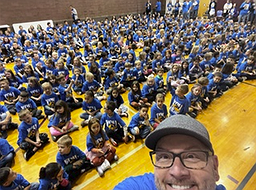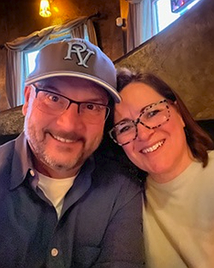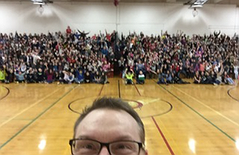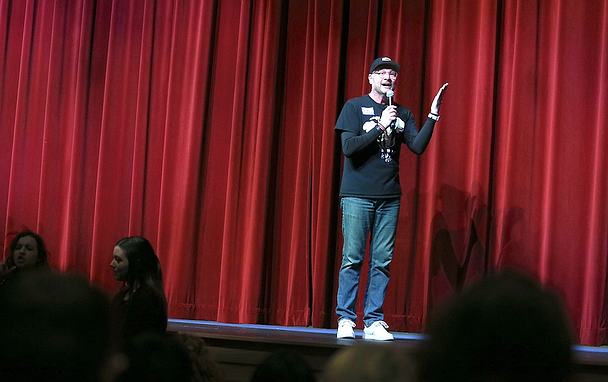FAST FIVE Stu Cabe reminds us to be nice to each other
Meet Stu Cabe, founder of The Ovation Company, a Coeur d'Alene-based school resource organization focusing on positive school climate and improved student achievement. Stu has been a professional presenter and trainer for over two decades. He travels North America to work with students and teachers to help build strong school communities and improve campus culture and climate. The Ovation Company's motto: Stand up for what is good. Info: ovationcompany.com
1) When and why did you start the Ovation Company?
After four years in the classroom and another five working for a private company, I began The Ovation company in 2006. I recognized a need for high-quality, authentic student interactions, especially in the K-8 grades. I noticed that certain people skills seemed to be lacking, or missing altogether, amongst our younger generation.
For those of us of a certain age (raised in the '70s, '80s and early '90s), we (generally) seem to recognize, and apply, the basics of simple human interactions — saying please and thank you, holding the door, respecting our elders, making eye contact, knowing how to represent ourselves in public places and delivering a professional handshake when necessary and appropriate. At 58 years old, these things are second nature. But why are our young people struggling with this? Well, the answer may be that we assume they are being taught, or handed down, somewhere along the way, and they are not. I am reminded of the anecdote of the girl EVERYONE knew was going to get asked to the prom, but in the end, nobody asked.
The Ovation Company exists to help young people learn (and apply) those necessary communication skills, fundamental to our success as a social species. Kindness, compassion and empathy are skills that must be taught and applied, so they too become second nature, not unlike knowing how to hold the elevator for someone or wait your turn at a four-way stop sign.
2) What is your personal experience with bullying, and why does this issue matter to you?
When I present to young people, I tend to be the narrator of other people’s stories rather than share my own. I have learned so much from others that I feel if someone’s story or experience impacted me, then perhaps it would impact others. Rarely does the spotlight find itself on me and my struggles. My personal experience with bullying was mostly from the verbal (unkind) things others would say that they KNEW would cut you to the bone. For me, what hurt the most (when I was young) were the personal attacks on my physical appearance. One’s appearance is the No. 1 subject in bullying, followed closely by attacking a person’s aptitude (abilities, or lack thereof). When I was a young 14-year-old kid, I was small and slender. One day, three older boys called me “stick arms” and spent five solid minutes berating me and my “tiny little stick arms.” To say that had an impact on me would be an understatement. Forty-four years later, I wear a long-sleeved shirt every day of my life, even on hot days. Hard to let that one go …
3) What are some of your key messages you share with kids so they grow up to be kind and compassionate?
In a nutshell, this is it: Work hard. Play fair. Be nice. To break that down is pretty simple. You have to:
• WORK HARD. Rarely are things in life just handed to you. You have to earn them. Same with respect. You must work hard for it. Compassion and empathy are also the product of hard work in that you must strive to see beyond yourself. Empathy is like a muscle, it gets stronger the more it is used and must be strong before you can provide support for others.
• PLAY FAIR. This is huge. I know I am just one guy with one opinion, but I would argue this is the whole ballgame — the key to everything in human nature. We tend to lose our minds when something isn’t fair. Fairness is what keeps balance, and many people might agree that perhaps our biggest struggle comes from our definition of what is fair and what is not.
• BE NICE. Yeah, I know, I know … Kindness should be the word we use. But I would suggest that kindness is a destination and “being nice” is an action word. Being nice is the application word. Kindness is the result word.
And for the curious who are still reading, you could Google the video “The Biggest Big Brother Program in the World.” It’s a true story about adolescent elephants. Because they lack role models, their behavior spirals out of control and they become juvenile delinquents. I use the story to compare our own human nature and what can happen when we too lack role models.
4) What is something people would be surprised to know about you?
I love to build things and I love tools! I have built a house, countless decks and fences and tons of remodels and improvements. I also use those tools to build cutting boards, charcuterie boards and furniture. I also like to watch '80s and '90’s movies on VHS ... repeatedly. I have seen "Pretty Woman" and "Die Hard" probably 75 times each. They are just fun to have in the background.
5) How can we, as grown-ups, be kinder in our everyday interactions with each other?
More than 20 years ago, we lost our first kitty to a rare form of skin cancer. He was 7 years old. On the day we had to put “Chester” down, two things were happening. 1) We were devastated. 2) We were going to have to explain to our two young children what death was. Not a great day. On the way home from the vet, Chester’s body wrapped in a towel making his final journey to be buried in our backyard, I had a woman in a burgundy minivan who just berated me for not “driving fast enough” or something. I mean, middle finger, yelling, the whole nine yards. I'm sobbing and she is yelling.
Sitting next to my seat was my 3-year-old son’s favorite toy: A white magnetic chalkboard. You write what you want and then erase it with a quick swoosh of a lever. I thought I would write the lady in the burgundy minivan a note. Why not.
"Dear lady in the burgundy minivan,
Would you please be nice to me today? We just put our little kitty to sleep, our hearts are broken and in five minutes we need to pull into the driveway and explain to our two little kids what death is and that we need to bury our beloved kitty in the backyard. Could cut me some slack?"
Of course, I didn’t have time to write those words while temporarily frozen at the stop sign. What I should have done, was write it ahead of time, right? And then hung the chalkboard around my neck like a little sign. That way, all could see my pain and struggle, and perhaps, just perhaps cut me a little slack. But that’s not how life works, does it?
So … what would I share with adults? You don’t know what is on people’s chalkboards! We aren’t wearing them for all to see. Be careful what you say and treat others as if you knew what was on their chalkboard. We all have bad days. Please don’t make someone worse just because you can. That’s just not fair.









